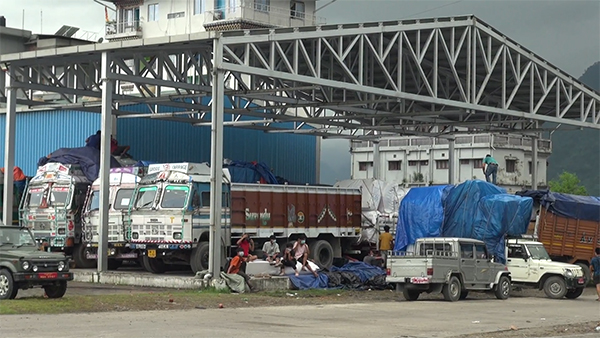 The government has revised and endorsed the interim rate for transhipment, loading and unloading of goods at the Phuentshogling dry port recently. The labour rates at the dry port increased drastically after regulated labourers were deployed to prevent the spread of COVID-19.
The government has revised and endorsed the interim rate for transhipment, loading and unloading of goods at the Phuentshogling dry port recently. The labour rates at the dry port increased drastically after regulated labourers were deployed to prevent the spread of COVID-19.
Bhutanese labourers carried out the transhipment, loading and unloading tasks at the dry port after the closure of the international borders due to the COVID-19 pandemic. The rates, however, increased by over 500 per cent.
The Hardware Association of Bhutan then wrote to the government and relevant agencies to regulate the rate. The association also asked for a separate place where transhipping can be carried out.
A few weeks back, the COVID-19 task force released new labour rates. According to the Hardware Association of Bhutan, while loading of a jumbo truck earlier cost them around Nu 18,000, it would now cost them just over Nu 4000.
Thinley Dorji, the Manager of Lhaki General Store in Phuentshogling and also the coordinator for the Hardware Association of Bhutan, says the government has been supportive in regulation the rates after their request. “Since the loading and unloading charges increased drastically, we had to inform the government. The government has been supportive. The government has regulated the rate as per the rate we submitted,” he said.
He added that the government has also allowed them to deploy their labourers and machines in the port. He also said they are following the COVID-19 Standard Operating Procedures of the Health Ministry while deploying their labourers.
Meanwhile, the labourers at the port said the reduction in labour rates at the port should also bring a decrease in the price of goods in the market.
Tanding Tshering, a loader at the dry port in Phuentshogling, says the labourers are willing to bear the cut in their charges but the same should be applied to the prices in the market. “Earlier when we charged high rates, the businessmen blamed labour rates here for an increase in the price of goods. It has been over two weeks since our rates have decreased and I am doubtful whether the prices for the goods have decreased or not. This has affected our income but we are ready to work here irrespective of decreased labour rate and risk,” he said.
“The rate has been reduced now. If we think properly, the earlier rate was not much of an issue because the money would remain within the country as all the labourers here are Bhutanese. This actually would have paved an opportunity for our youth and replacement of foreign labour,” added Kencho Tshering, also a Loader in Phuentshogling.
The Hardware Association of Bhutan said the prices of goods also decreased in line with the revised rate of labour.
Kinley Dem/Sonam Penjor







